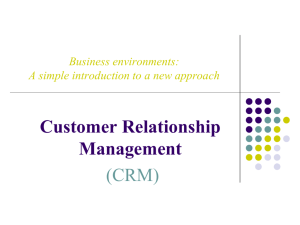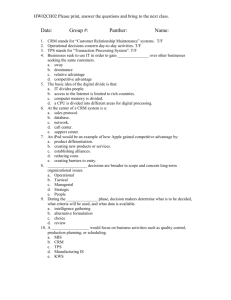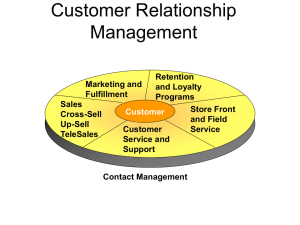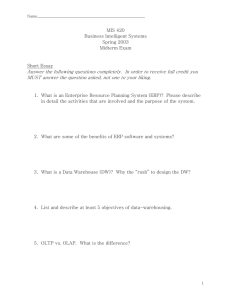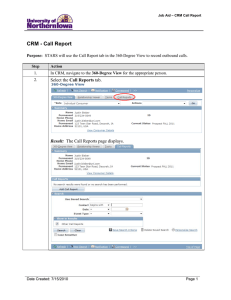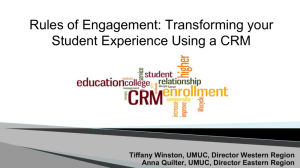RESEARCH AT CRANFIELD SCHOOL OF MANAGEMENT
advertisement
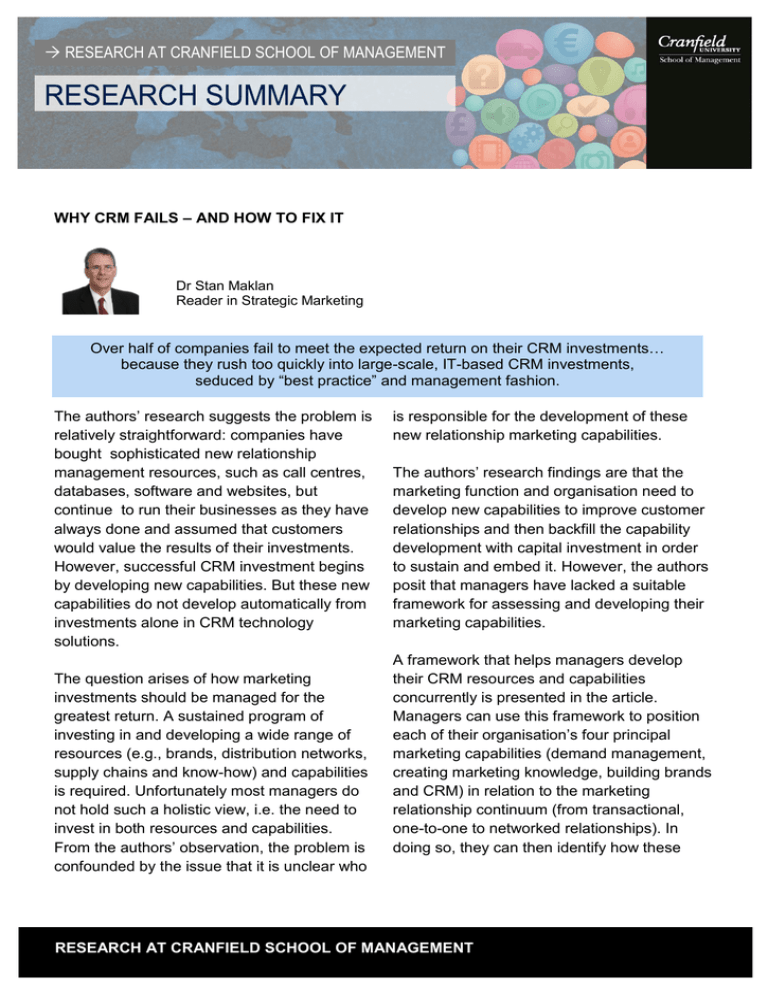
RESEARCH AT CRANFIELD SCHOOL OF MANAGEMENT WHY CRM FAILS – AND HOW TO FIX IT Dr Stan Maklan Reader in Strategic Marketing Over half of companies fail to meet the expected return on their CRM investments… because they rush too quickly into large-scale, IT-based CRM investments, seduced by “best practice” and management fashion. The authors’ research suggests the problem is relatively straightforward: companies have bought sophisticated new relationship management resources, such as call centres, databases, software and websites, but continue to run their businesses as they have always done and assumed that customers would value the results of their investments. However, successful CRM investment begins by developing new capabilities. But these new capabilities do not develop automatically from investments alone in CRM technology solutions. The question arises of how marketing investments should be managed for the greatest return. A sustained program of investing in and developing a wide range of resources (e.g., brands, distribution networks, supply chains and know-how) and capabilities is required. Unfortunately most managers do not hold such a holistic view, i.e. the need to invest in both resources and capabilities. From the authors’ observation, the problem is confounded by the issue that it is unclear who is responsible for the development of these new relationship marketing capabilities. The authors’ research findings are that the marketing function and organisation need to develop new capabilities to improve customer relationships and then backfill the capability development with capital investment in order to sustain and embed it. However, the authors posit that managers have lacked a suitable framework for assessing and developing their marketing capabilities. A framework that helps managers develop their CRM resources and capabilities concurrently is presented in the article. Managers can use this framework to position each of their organisation’s four principal marketing capabilities (demand management, creating marketing knowledge, building brands and CRM) in relation to the marketing relationship continuum (from transactional, one-to-one to networked relationships). In doing so, they can then identify how these RESEARCH AT CRANFIELD SCHOOL OF MANAGEMENT capabilities must be developed in order to execute their desired CRM strategy. This approach is utilised and described in two UK examples: 1) BMW Ltd. (UK) who in the early 00s decided to delay its investment pending further capability development in relationship management; and, 2) Flutter, an online betting company, who, after going through a programme of identifying its true marketing capabilities, invested in a less expensive and different aspect of CRM than it had first intended. Key insights emerge for managers responsible for their companies’ CRM investment decisions from the action research undertaken: team needs patience and the courage to eschew “neat” global solutions, consultants’ best practice models and their own preference for immediate results by allowing marketing capabilities to develop and lead CRM investments. Maklan, S., Knox, S., Peppard, J. (2011) Why CRM Fails – and How to Fix It, Sloan Management Review, vol. 52, no. 4, pp. 7785. For further details on this research paper please contact: s.maklan@cranfield.ac.uk WATCH THE VIDEO INTERVIEW • Capabilities are the precursor of CRM investment and not vice versa • The rate at which capabilities develop varies between companies • CRM cannot always be driven topdown. As a result of the research, and in answer to the question of why is it that so many large, well-managed and well-resourced companies fail to see adequate return on their CRM investments, the authors argue that it is precisely because these leading companies are usually so well endowed with resources that they rush too quickly into large-scale, ITbased CRM investments, seduced by “best practice” and management fashion. Somehow, the capabilities needed to support these resource investments get forgotten. The top http://tinyurl.com/ca2svmo Management Theme: Marketing, Sales and Client Relationships MANAGEMENT THEMES AT CRANFIELD SCHOOL OF MANAGEMENT Business Economics and Finance Business Performance Management Corporate Responsibility and Sustainability Entrepreneurship and Business Growth General Management Information Systems Innovation and Operations Management Leadership Managing People and Global Careers Marketing, Sales and Client Relationships Programme and Project Management Strategy, Complexity and Change Management Supply Chain and Logistics Management
